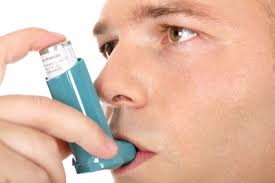
1. Allergic (extrinsic/ atopic) Asthma – This type of asthma usually starts in childhood and is often preceded by eczema. But most of the young adults (<35 yrs) developing asthma also fall in this category. Genetic factors also play a significant role i this. In this type of asthma the allergen leads to production of excessive (IgE) immunoglobulins.
2. Infective or Intrinsic Asthma – This is not hereditary or allergic, but may be caused by, or at least associated with upper respiratory tract or bronchial infection which is usually viral.
3. Emotional Asthma – Psychological factors (like anxiety, emotional stress etc) are often considered to be the sole cause of some asthmatic attacks, but it is still not certain whether it can be the sole cause or is only a precipitating factor.
4. Occupational asthma – This can occur in certain industries in which there is exposure to metallic dusts (esp. platinum salts), biological detergents, toluene diisocyanate, polyurethane, flour and dust from grains etc.
What ever may be the cause, it ultimately leads to paroxysms of bronchial obstruction produced by widespread bronchial spasm accentuated by plugging of the bronchi with excessive mucus.
Asthma – SIGNS AND SYMPTOMS
Recurrent episode of paroxysmal dyspnoea (difficulty in breathing)
The breathing is laboured, with a wheezing sound, mainly on expiration.
Asthma attacks often occur in the early hours of morning (when there is no immediate precipitating cause). During the attack patients often prefers to sit then lie down.
Asthma – HOW DIAGNOSIS IS DONE?
Diagnosis can usually be made clinically by a competent doctor. Allergen sensitivity tests, X-ray, spirometry, sputum and blood tests etc may be of use in finding the cause and severity of the condition.
Asthma – WHAT TO DIFFERENTIATE FROM?
- Bronchitis
- Cardiac asthma
- Renal asthma
- Isolated attacks of non-paroxysmal dyspnoea.
Asthma – COMPLICATIONS
Apart from chronicity, usually no complications.
Pneumothorax, emphysema, or areas of consolidation or pulmonary collapse may occur in very advanced cases.
Asthma Treatment
Asthma – Homeopathy Treatment & Homeopathic Remedies
General Approach – Homeopathy is a system of medicine which tries to ‘cure’ this disease, instead of trying to provide symptomatic relief. While dealing with a case of asthma, a homeopath not only records the symptoms of the disease but also studies the medical history, family history, physical and psychological characteristics of a person. This helps to find the cause, the precipitating factors, and the hereditary tendency etc. Of special interest to a homeopath is the history of suppression of skin disease. Homeopaths believe that when there is a tendency or predisposition for a disease – it first manifests on the less vital organs, towards the periphery (like skin). If this manifestation is suppressed than the disease shifts inwards, towards the more vital organs (like lungs, heart, brain etc).
The fact that in children asthma is often preceded by eczema is observed by the allopaths also. This fact is written in all their textbooks of medicine. They say that children often ‘move-out’ of eczema and ‘move-into’ asthma. But they are unable to make a correlation. Homeopaths believe that the suppression of eczema with topical preparations, does not cure the disease/sensitivity of the person, it merely drives it inwards.
Now after ascertaining the symptoms and the cause, the homeopath tries to find a medicine which matches the symptoms as well as the general characteristics of the person. The medicine so selected is administered to the patient.
It is often (not necessarily) observed by homeopaths that when a right medicine is given, the asthma disappears but the old eczema or skin rash (if it was there originally) reappears for some time, before finally disappearing itself. This reappearance of old symptoms is seen as a reversal of disease process and is considered a very good prognostic sign by homeopaths.